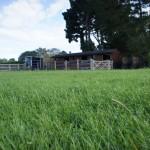Grass Sickness As the name suggests Equine Grass Sickness (EGS) or Equine Dysautonomia is a disease that affects almost exclusively grass kept animals.
Good Quality Grazing
This devastating disease,Β affects the nervous system causing colic, muscle tremors, constipation, weight loss and difficulty swallowing. The cause of grass sickness is unknown despite almost 100 years of investigation.
Research suggests that the damage caused to the nervous system is toxic in nature and it is currently thought that clostridium botulinum, which is a soil associated bacteria, may be involved. Until the cause is discovered it is difficult to give advice regarding prevention.
For owners who have horses in areas where the disease is prevalent, spring and summer can be a worrying time of the year. Stabling the horse during this time can reduce the likelihood of disease especially following cool, dry spells of weather. This is particularly advisable for youngsters that have recently been moved to the premises.
Construction work, leading to pasture disturbance, is another management related risk factor and if building work is taking place it may be advisable to avoid that field. Unfortunately many owners keep horses in situations where they have little say over which field their horse occupies or have no alternative to grazing. These are cases where protective factors should be instigated.
Co-grazing with ruminants is thought to reduce the risk as is hand removal of droppings as opposed to mechanical removal. It has been suggested that supplementary feeding may also help although this is not proven. Often the presenting symptom of EGS is severe colic. Prompt clinical examination from your vet might alert him or her to the possibility of grass sickness or a previous history of the disease in the area might cause suspicion but the only accurate method of making a conclusive diagnosis is by taking a biopsy from a piece of intestine. Unfortunately this is often done at post mortem but can occur during colic surgery.
It is possiblee to take these biopsies under standing sedation. This can avoid the necessity for a general anaesthetic in cases where cost may be an issue. From acute cases, which are euthanased almost immediately, to chronic cases which require round the clock nursing, EGS is a distressing and frustrating problem. Until a cause is found and a form of prevention developed this disease will continue to challenge vets and devastate owners.
The Stable Doctor
https://primestables.co.uk/news
Advice is given without legal responsibility


